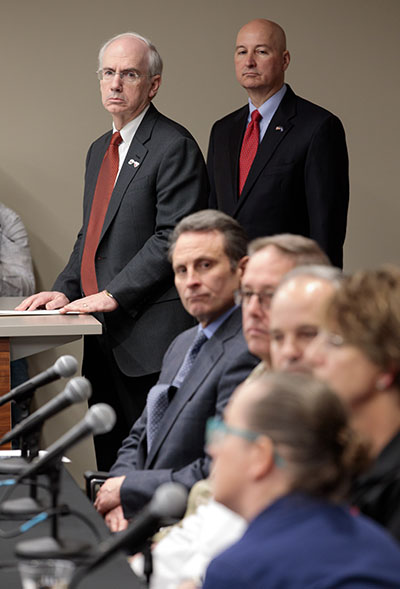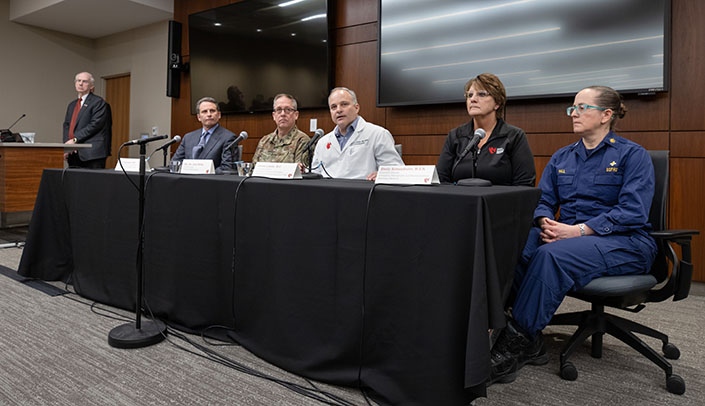The United States government is again calling upon UNMC and Nebraska Medicine to help American citizens during a time of need.
Thursday morning, state and federal officials joined medical center leaders at a press conference to explain what form that help will take.
 |
From left, Chancellor Jeffrey P. Gold, M.D., and Nebraska Gov. Pete Ricketts look on as the panel of experts speaks to the media at Thursday’s press conference. |
A plane carrying 75 rescued Americans and their families now working in China is scheduled to arrive in Omaha today, after making one or more stops en route. This effort is part of a larger one designed to bring hundreds of Americans home from China because of the ongoing coronavirus outbreak.
See video from news conference
The flight will be handled at a remote and isolated aircraft parking area at Eppley Airfield and will not occur at the Eppley Airfield terminal. The arrival of the flight will have no impact on Omaha passengers, and flight operations at Eppley Airfield will remain normal and unaffected.
“It’s important to note that we expect these individuals to be healthy upon arrival,” said Eric Kasowski, M.D., of the Centers for Disease Control and Prevention, speaking at the press conference at the Fred & Pamela Buffett Cancer Center Thursday morning. “They will have been screened many times before arriving here. The purpose of the quarantine is to identify any new onset of illness among this group right away, should it develop.”
“The University of Nebraska Medical Center and Nebraska Medicine have been long-prepared and ready to provide support to our state and to our country when asked,” said Jeffrey P. Gold, M.D., chancellor of the University of Nebraska Medical Center and University of Nebraska at Omaha.
“Over the past week, we’ve stood ready to help however we could as this novel coronavirus spread in China and now to 28 other parts of the world. Our world-recognized team leading the UNMC Global Center for Health Security, has been working constantly for the past 10 days with our federal, state and local partners to plan the safe return of these Americans and their families to their home-nation soil and, shortly later, back to their communities.
Information line
If the public has questions about the novel coronavirus or Nebraska’s role in the U.S. response, the Douglas County Health Department has created an information line: 402-444-3400.
“I am not a Nebraskan by birth, I am a Nebraskan by choice, and days like this make me incredibly proud to be a Nebraskan and to be an American.”
Passengers will be screened by U.S. Government health officials before takeoff in China, upon landing at a U.S. airbase en route, and again will be screened upon arrival in Nebraska. Nebraska Medicine and UNMC are working in tandem with the U.S. Department of Health and Human Services, the Centers for Disease Control and Prevention (CDC), Douglas County Health Department, Sarpy-Cass County Health Department, Lincoln-Lancaster Health Department, Nebraska Emergency Management Agency, Nebraska Department of Health and Human Services, Three Rivers Health Department and the Nebraska National Guard on the effort to bring these rescued Americans home in this critical time of need.
These individuals will be monitored for 14 days at Camp Ashland, an Army National Guard Camp outside of Ashland, Nebraska. Should any of them develop symptoms or have a laboratory-confirmed test during the monitoring period, they will be cared for in the world-class facilities on the campus of the Nebraska Medical Center. The medical center is home to the 20-bed National Quarantine Center and the 10-bed Nebraska Biocontainment Unit (NBU). NBU staff cared for patients with Ebola in 2014 during the epidemic outbreak in western Africa.
Getting questions about our response?
Review these talking points for colleagues who may need to answer questions about Nebraska Medicine’s involvement with the response to coronavirus. This will be updated as new information is available.
“There is no better place for these American citizens to be,” Dr. Gold said. “Our team of health care professionals served in our nation’s time of need in 2014 and since then has led the world in developing the latest global health security protocols. Our team has done this before and regularly educates others on the best practices in situations such as these. In short, they know as much about this as just about anyone else in the world.”
“We’re doing this because we are in a position to rescue American citizens at a time when they and their families need us,” said James Linder, M.D., CEO of Nebraska Medicine. “We have exceptional people to do the job, to do it safely and to do it effectively. Those we’ll be monitoring are Americans who wanted to evacuate the outbreak area and return to the safety of their home country. Because of our expertise, it’s our duty to answer the call and help in any way we can.”
“We feel that we have the best facility in the world to manage this type of eventuality,” said James Lawler, M.D., executive director, international programs and innovation, Global Center for Health Security at UNMC. “Our all-volunteer staff has been training and preparing for years exactly this circumstance.”
The list of initiatives involving biopreparedness on the med center campus is extensive. The Global Center for Health Security features the Nebraska Biocontainment Unit, National Ebola Training and Education Center (NETEC), National Disaster Medical System (NDMS) training and the recently opened Training, Simulation and Quarantine Center (TSQC), just to name a few. The TSQC is a facility designed to train federal personnel to treat highly infectious diseases and to create a place to monitor people who may have had a high-risk exposure. The TSQC, made possible via a contract with the U.S. Department of Health and Human Services, is not being used for monitoring in this case because of the large number of people involved.
“We’re always in a ready state at the quarantine unit as well as the Biocontainment Unit,” said Shelly Schwedhelm, executive director of emergency management and biopreparedness at Nebraska Medicine. “That’s what we practice and prepare for. We already work very strongly with the federal government to support these endeavors, whether its education and training or care of individuals who need us.”
Once the rescued Americans finish their 14-day monitoring period and public health experts are convinced they are not exhibiting symptoms or laboratory signs of the coronavirus, they will return to their homes in hte United States.
Dr. Kasowski and Nebraska Gov. Pete Ricketts advised Nebraskans to turn to trustworthy sources for information on the novel coronavirus.
“The Centers for Disease Control and Prevention and the World Health Organization websites, and a number of other trusted sources, that’s where you’re going to get the most up-to-date, science-based information as we learn more about this coronavirus,” Dr. Kasowski said.
Nebraska Medicine has posted a coronavirus question-and-answer page on its website, as well.

Thanks for being a resource for our U.S. citizens and armed forces!!